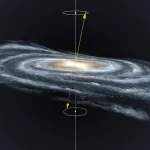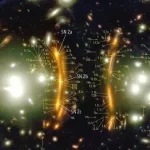Key Takeaways:
- Harvard astronomer Avi Loeb proposes a novel theory about the origin of our universe.
- The mystery of what happened before the Big Bang has puzzled scientists for decades.
- Loeb suggests that an advanced civilization might have created our universe through quantum tunneling.
- This theory combines elements of quantum mechanics and the concept of a creator.
- It challenges conventional ideas about the purpose and origin of our universe.
Harvard Professor Avi Loeb has ignited scientific curiosity with his astonishing theory about the origins of our universe. In the realm of cosmology, one of the most profound enigmas has always been what transpired before the colossal explosion known as the Big Bang. This question challenges our very understanding of the universe’s inception and existence.
Nearly a century ago, even the great Albert Einstein sought alternatives to the Big Bang theory because the idea of a universe with a definitive beginning didn’t sit well with his philosophical inclinations. Since then, scientists have proposed various conjectures to account for the cosmic origins. These range from the notion of our universe emerging from a vacuum fluctuation to the possibility of cyclic patterns of contraction and expansion.
However, one less-explored and captivating possibility has emerged on the scientific frontier: the notion that our universe might have been meticulously crafted in the laboratory of an exceptionally advanced technological civilization. This civilization, according to Loeb’s hypothesis, may have possessed the capability to generate a new universe from scratch through quantum tunneling.
What makes this hypothesis even more intriguing is its potential to reconcile religious and secular perspectives. It harmonizes the concept of a creator with the principles of quantum gravity. Although we currently lack a predictive theory that seamlessly melds quantum mechanics and gravity, Loeb suggests that a sufficiently advanced civilization might have already achieved this synthesis and mastered the art of creating “baby universes.”
This theory not only offers an explanation for the origin of our universe but also presents the idea that our universe is akin to a biological system, continually reproducing itself through generations. It challenges the notion that our universe was uniquely designed to host humanity, as proposed by the anthropic principle. Instead, it suggests that our universe was crafted to give rise to civilizations far more advanced than ours.
In this scenario, these “smarter kids on our cosmic block” would be the drivers of a cosmic Darwinian selection process. They possess the knowledge and technology to create new universes, whereas we, with our current technological limitations, cannot replicate the conditions that led to our existence.
This perspective reshapes how we gauge the technological prowess of civilizations. Rather than measuring their power consumption, as suggested by the Kardashev Scale, we should assess their ability to recreate the astrophysical conditions necessary for their existence. According to this framework, our civilization ranks relatively low, as we struggle to ensure the habitability of our planet after the sun’s demise.
A truly advanced civilization, class A on this cosmic scale, would not only be able to manipulate its immediate environment independently of its host star but could also reproduce the cosmic conditions that gave rise to it. Achieving this status is a monumental challenge, and the scientific literature has already delved into the obstacles, such as generating sufficient dark energy within a confined space.
Furthermore, if self-replicating universes only require a single class A civilization, then the most common universes would likely be those that barely meet this criterion. Anything more advanced would require additional rare circumstances and would not significantly benefit the evolutionary process of creating baby universes.
Loeb’s theory also challenges our perceptions of human intelligence and our place in the cosmos. It suggests that we might statistically fall within the average range of intelligent life-forms in the universe. In essence, our celebrated scientific discoveries, like the Higgs boson, might not necessarily elevate us to cosmic superiority.


